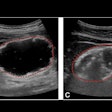Sunday, November 27 | 11:45 a.m.-11:55 a.m. | SSA13-07 | Room E451A
In this scientific paper presentation, a U.K. team will describe results from using an ultrasound-guided botulinum toxin injection to treat muscle patterning instability in shoulders.Muscle patterning instability is a complex and underreported condition that results in recurrent instability and pain within the shoulder joint. The group hypothesized that patients not responding to conservative measures might benefit from an ultrasound-guided injection of botulinum toxin into the fasciculating muscle to temporarily paralyze it to reduce instability and pain symptoms.
The researchers studied the technique in five female patients with long-term recurrent instability. Good results and symptomatic improvement were achieved, according to presenter Dr. Monica Khanna said.
The ultrasound-guided procedure allows visualization of the shoulder girdle musculature in real-time with excellent spatial resolution, enabling identification of the fasciculating muscle, Khanna said. The ultrasound-guided injection can then be performed directly into the fasciculating muscle, avoiding the need for a general anesthetic and electromyography studies.
It's also well-tolerated by patients, she said.
"This ultrasound-guided technique is both diagnostic in terms of identifying the fasciculating muscles present in this condition as well as therapeutic in accurately directing needle placement into the affected muscle and injecting botulinum toxin," she said. "This is a safe, accurate, inexpensive, and well-tolerated procedure."




















